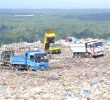By John Rizle L. Saligumba
Davao Today
First of two parts
DIGOS CITY, Davao del Sur — Government may find it an “expensive emergency measure” to put up coal-fired power plants to address the power crises in the country but more especially in Mindanao, the country’s climate change lead negotiator in the United Nations said.
“Dapat sa long term marami tayong ginagawa para renewable energy at clean energy sources o kahit mga transitional fuels ang gamitin natin para mas maging sustainable ang ating pag-unlad, (We shoud be doing more in the long term so that we we are able to utilize clean energy sources or transitional fuels so our development would be more sustainable),” Climate Change Commissioner, Naderev Saño, told an interview at a climate change forum in Davao del Sur.
Saño is also the Philippine lead-negotiator to the United Nations Climate Summit.
He said that renewable fuel sources “do not become expensive through time, unlike fossil fuels”. “Pamahal ng pamahal yan at darating ang panahon na ipapasa natin sa consumers yan. (Time will come when we have to pass it [expenses] on consumers),” he said.
Saño said the Philippines is supposed to be “rich with renewable energy sources.”
“Sa geothermal tayo yung pangalawang pinakamalaking producer ng geothermal electricity, hydropower napakarami sa Pilipinas, ocean energy has vast potentials pero mahal ang teknolohiya (We [Philippines] are the second largest producer of geothermal energy, hydropower is widely available in the Philippines, ocean energy has vast potentials but the technology is epxensive),” he said.
He said that wind is limited but solar has a good potential.
“However, kung tumingin ka sa global market ng mga technologies na ito, napaka-inaccesible sa mga bansang katulad natin dahil nagiging negosyo ito rather than a solution for a global problem tulad ng climate change (However, if you look at the global market for these technologies it is very inaccesible for countries like us because it is a business rather than a solution for a global problem like climate change),” he said.
Saño said that the Philippines “should call on developed countries not to sell these technologies to poor countries.”
“Tulungan niyo kaming gumamit ng teknolohiya na yan para maging malinis ang aming pag-unlad at hindi lalala ang climate change. Dahil kapag nagbuga ka ng carbon emissions sa atmosphere it doesn’t matter kung saan galing na bansa ka at pupunta yan sa atmosphere at lahat ay maapektohan (Help us use these [renewable energy] technologies so our development would not worsen climate change. If carbon is emitted to the atmosphere, it doesn’t matter what country it came from, it will affect us all),” he said.
Meanwhile, the First Vice President for Mindanao Affairs of Aboitiz Power Corporation, Manuel Orig, said he agrees with Sano, but that the company’s investment in coal is intended to build on a reliable energy source.
“Why coal?” he said “it can be relied upon even on the most adverse weather conditions,” he said.
Orig was invited to the forum to explain how their company’s coal-fired power plant affects climate change. Orig said that Aboitiz Power agrees with Saño’s position on climate change, and points out that their company “is the biggest investor in renewable energy”.
However, Orig said that there is “not enough renewable energy resources available in Mindanao” to sustain development”.
“In addition to renewable energy, we will tap coal,” he said.
Orig said that the island needs an “adequate, reliable and affordable” source of power but from a source that “will not harm the people.”
He said that Mindanao power is cheapest at P7.53 per kilowatt hour compared to P10.64 in the Visayas and P14.85 in Luzon.
Orig said that the Mindanao rate is lower because it is “heavily subsidized” by the government but “do not reflect the true cost of power.”
Orig’s company is building a 350 megawatt (MW) coal-fired power plant in Davao City which it aims to expand to 645 MW if allowed by the local government.
Orig said that those who oppose tapping coal power plants “are compromising the interest of the greater majority of Mindanaoans who do not want to repeat the problems of the past like prolonged and frequent brownouts”.
But Dr. Jean Lindo of the No to Coal! Davao alliance and a reactor to the speeches of both Saño and Orig, said an “independent” body needs to be tapped in order to have a “scientific and realistic baseline and impact assessment data” on the effects of the coal plant.
Lindo also demands that an “independent energy audit” be conducted to determine the real demand, supply and potential sources of energy in the island. (John Rizle L. Saligumba/davaotoday.com)
End of first part










